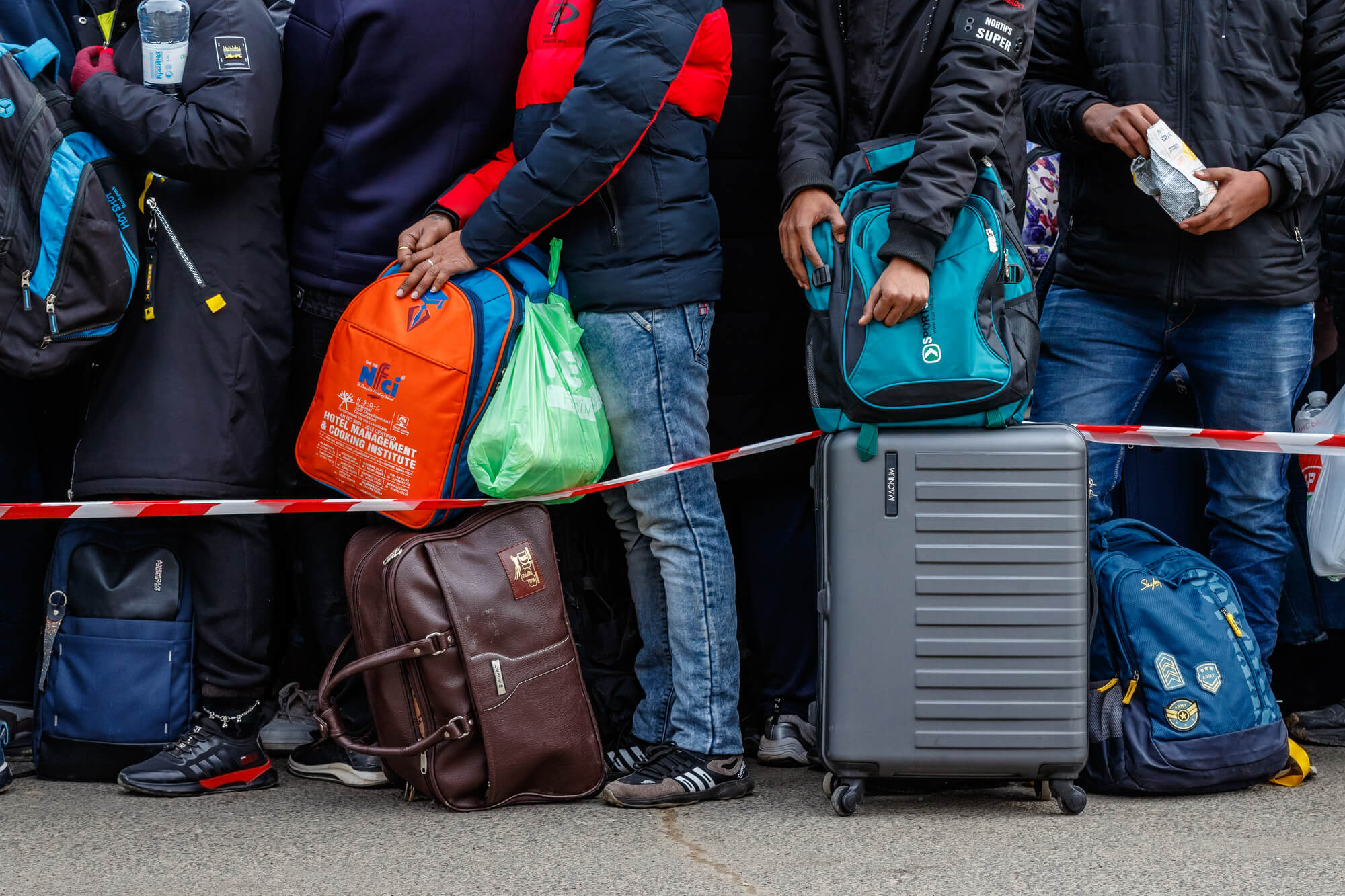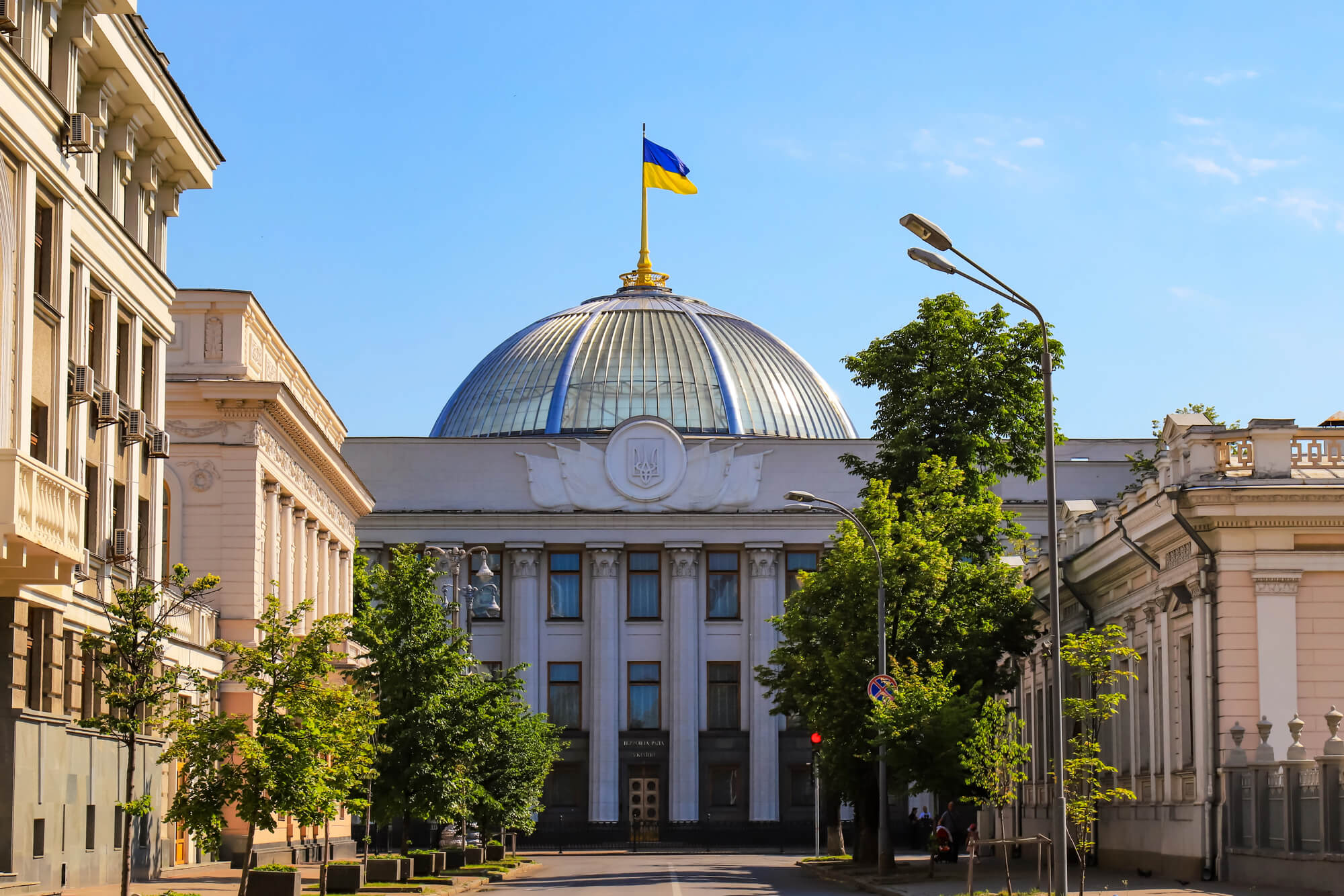On October 20, 2014 the Ukrainian Parliament passed the Law “On the rights and freedoms of Internally Displaced People” (hereinafter the Law on IDP). This piece of legislation generally makes a good impression on the public and reflects the willingness of Ukrainian authorities to provide a proper, active response to the widespread critique. For instance, the Law addresses three major requests previously expressed by Human Rights Watch: it establishes Unified IDP State Registry, endorses simplified procedures for obtaining new residency registration and (in cooperation with UN bodies and reputable NGOs) takes steps aimed at raising awareness of government agencies’ work on IDP problems.
This law also introduces a set of protections of educational, property and labor rights, and regulates the provision of humanitarian help by broadening and upgrading the set of measures previously introduced by the Law “On Ensuring Rights and Freedoms of Citizens and the Legal Regime in the Temporarily Occupied Territory of Ukraine” (hereinafter the Law on Occupied Territories). However, there are a number of important issues either entirely ignored or only partially covered. This post aims to discuss serious omissions and grey areas in Ukrainian regulations governing IDP protection.
– Bob Dylan
Definition and Citizenship Requirement
There is no globally accepted definition of IDP in international law and states have full discretion over outlining the notion in the domestic legislation. Article 1 of the Law on IDP defines an internally displaced person as “[…] a citizen of Ukraine […], who was forced to leave or voluntarily left the place of residence in order to avoid or as a result of the negative effects of armed conflict, temporary occupation, widespread violence, massive violations of human rights […].” Thus, only Ukrainian citizens may benefit from protection granted under the Law. This definition narrows down the concept adopted in the Guiding Principles on Internal Displacement, which defines IDP as “persons […] who have been forced or obliged to flee or to leave their homes or places of habitual residence.” Instead of citizenship, this definition requires an individual to demonstrate that he/she has been protractedly or permanently living in the particular state as a prerequisite to qualify for an IDP status.
Therefore, it covers a larger group of people affected by a conflict, including stateless persons or foreign nationals who have been permanently residing (or admitted for a prolonged period) in the conflict territory. While IDP status entitles this broader social group to the rights and guarantees relevant to their protection during displacement, return or resettlement, it does not automatically award them with rights specifically reserved to citizens (e.g. the right to vote). A broader definition becomes important in light of family rights, which are not specifically highlighted in the new Law on IDP. Thus, the Law on IDP fails to ensure that family members are equally entitled to IDP protection (e.g. in situations where a child is a citizen of Ukraine and his/her parents are foreign nationals). Clause 3 of the transitional provisions of the Law on IDP implies that amendments concerning foreign nationals, stateless persons and refugees shall be made in relevant legislative acts, but the reason for their exclusion in the scope of application of this particular law is not clear. Hence, it is highly recommended to revise IDP’s definition to include non-citizens permanently and habitually residing in the zone affected by the conflict (in the East/in Crimea).
IDP Cessation Clause
There is no internationally agreed standard regulating the cessation of an IDP status. Article 12 (1.3) of the Law on IDP provides that a person loses the IDP status if he/she returns to the place of habitual residence. This clause is commonly adopted by states in the cases where durable solutions to internal displacement have been implemented. Such solutions include 1) return to the place of origin; 2) local integration in hosting communities; and 3) settlement in other countries if these solutions are accompanied by long-term safety and security, compensation for lost property and economically and socially sustainable environment for former IDPs. The logic of these solutions should be interpreted as follows:
In the Ukrainian case, this logic is not present in the enacted clause mentioned above. When internally displaced person returns to the place of habitual residence, her IDP certificate (along with special protection) is nullified and, if necessary, substituted with another certificate under the Law on Occupied Territories. The Law on Occupied Territories is repealed once the occupied territory returns under Ukraine’s general jurisdiction, provided that compensation has been made to those affected by the occupation. However, the Law on IDP does not have any similar clause on termination; hence, the people who are subject to protection under the act may enjoy it for an indefinite period of time. In certain circumstances, it may create an incentive for IDP to abstain from returning to places of habitual residence even when the armed conflict is over to prolong their social and economic benefits.
External and Internal Discrimination
Unlike the Law on Occupied Territories, The Law on IDP contains a non- discrimination clause. Article 14 of the Law on IDP stipulates: “[i]nternally displaced persons shall enjoy the same rights and freedoms under the legislation of Ukraine and international agreements as other persons. Discrimination on the ground that the person is internally displaced shall be prohibited in the exercise of any rights and freedoms.” The narrative style of this article clearly indicates that the government is aware of the discrimination issues arising with respect to IDPs; but simultaneously, authorities are too busy to take a deeper insight to the problem and prefer to shrug off the critique by adopting a general blanket clause. It is important to note that IDPs most commonly face two types of discrimination: (1) discrimination of the IDP within the hosting community; and (2) discrimination among diverse social groups within IDP community. Article 14 attempts to address only the first type and is very unlikely to succeed.
Various reputable international organizations have urged the Ukrainian government to address the problem of IDP’s discrimination in hosting communities on multiple occasions. For instance, here is a quote from HRW’s open letter to President Poroshenko (July 21, 2014):
The growing dissatisfaction of the Western Ukrainian population with the increasing number of IDPs from the East is easily traceable through postings in social media. However, such problem is not surprising: population hosting IDP do so at significant costs to themselves. In Ukrainian scenario, this issue is additionally complicated by the notable cultural difference between the western and eastern populations in traditional social structures, behavioral norms, livelihoods, etc. The government is likely to worsen such adversarial attitudes by singling out the IDP category with the purpose of granting them additional benefits. So far the best advice to remedy such dissatisfaction is to address the needs of the displacement-affected communities (i.e. IDPs, hosting communities, communities receiving returning IDPs) instead of focusing solely on IDPs.
The other problem of the utmost priority, emphasized by all international human rights organizations, is granting additional protection to the groups with inherent vulnerability within IDP populations (see principles 4, 7 (3d), 18(3), 19 (2), 20 (3), 23 (3,4) of the Guiding Principles). Research reveals several categories of persons with inherent vulnerability: minors, single parents, older persons without family support, single or unaccompanied women, pregnant or lactating women, women-headed households (widows or orphans), persons with disabilities and traumatized persons and members of ethnic/religious minorities. These populations most often face sexual or economic exploitation, exclusion from political participation, hardships with claims concerning their traditional land/property, denial in assistance for needs, e.g. water consumption, medical treatment. Therefore, legislators and executives are obligated to develop and implement mechanisms for providing adequate remedies in cases of discriminatory practices and ensure the empowerment of these social groups.
Enforcement and State Responsibility
The Law on IDP does not introduce any specific enforcement mechanism or provisions that would hold the government responsible for a failure in implementation. The most controversial of all adopted provisions is Article 15(3), which stipulates that the responsibility to provide for an adequate compensation rests upon the state, which caused an internal displacement by the act of aggression or annexation of Ukrainian territory. There also exists a similar provision on Russia’s responsibility for the violation of civil and political rights on occupied territories in Article 5(3) of the Law on Occupied Territories. The explanatory note emphasizes the significance of the provisions endorsing Ukrainian regress suits against the Russian Federation. These provisions raise eyebrows since there is no international judicial body that has recognized Russia’s responsibility for any type of violations in the occupied Ukrainian territory. Even a hearing has yet taken place.
In the case of Georgia vs Russia International Court of Justice has established that Georgia was precluded from recourse since it failed to enter into negotiations with Russia or to follow special procedures under the Convention on the Elimination of Racial Discrimination. Thus, certain diplomatic actions are required even prior to the international judicial bodies’ address, while decisions of these bodies (once they gain jurisdiction to hear the case) may not necessarily favor Ukraine’s position. However, Ukrainian legislators were obviously opinionated to assume Russian responsibility and incorporate this assumption into national legislation. This provision is even more nonsensical when considering the fact that Ukraine’s domestic legislation does not affect the Russian Federation’s legal responsibility in any possible way. Rather, Ukrainian authorities should focus on their own responsibility to protect their own citizens rater than search for alternative ways to shift the blame on Russia.
Conclusion
The newly adopted Ukrainian legislation governing the IDP protection has a very distinctive logic to its structure, if compared to international norms. Relevant international humanitarian laws envision three major blocks of mechanisms aimed at protecting civilians: (1) measures aimed at preventing displacement; (2) measures undertaken during a displacement; and (3) measures enhancing the return of a displaced person. In contrast, the Ukrainian approach divides the population affected by a conflict into two major groups: citizens, who moved from the occupied territories (satisfying the criteria of the Law on IDP) and those who stayed (protected by the Law on Occupied Territories).
However, such logic leaves various social categories (foreigners, stateless persons, refugees) without due attention. Additionally, both laws are pointing at various problematic issues in a chaotic manner; instead of addressing the needs of a certain social group on each of the three stages of displacement, legislators attempt to adopt a single measure to be in effect for an indefinite period of time (e.g. state registration or housing) and to tie certain rights to this measure (e.g. family reunification as part of the registration policy requirement). Although the concept of IDP is relatively new and it is hard to judge the effectiveness of this particular logic, Ukrainian authorities should be more cautious when setting the boundaries for IDP protection. They should develop and implement measures aimed at intensive political engagement of the displaced population and make sure that discriminative treatment targeting IDP is not tolerated.
At this stressful time of a frozen conflict and a growing displacement crisis there is a strong government interest in demonstrating the state’s ability to return to normality, stability and safety. One of the most distinctive markers of these features is that there is no longer any person internally displaced and demanding extra protection within the state. On the other hand, the state might be interested in precluding IDP from assimilation/integration within the hosting communities: in this way, the displaced people may be forced to return to the (previously) occupied territories. The world is carefully watching Ukraine choosing the path to follow and to keep promises embodied in the new legislation.
The commentary was prepared for JURIST, a web-based legal news and real-time legal research service at the University of Pittsburgh School of Law. The original article is available here.
Attention
The author doesn`t work for, consult to, own shares in or receive funding from any company or organization that would benefit from this article, and have no relevant affiliations



